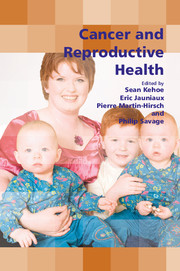Book contents
- Frontmatter
- Contents
- Participants
- Preface
- SECTION 1 Epidemiology, Genetics and Basic Principles of Chemotherapy and Radiotherapy
- SECTION 2 Fertility Issues and Paediatric Cancers
- SECTION 3 Gynaecological Cancers and Precancer
- SECTION 4 Diagnostic Dilemmas
- SECTION 5 The Placenta
- SECTION 6 Non-Gynaecological Cancers
- SECTION 7 Multidisciplinary Care and Service Provision
- 21 Multidisciplinary care
- SECTION 8 Consensus Views
- Index
21 - Multidisciplinary care
from SECTION 7 - Multidisciplinary Care and Service Provision
Published online by Cambridge University Press: 05 October 2014
- Frontmatter
- Contents
- Participants
- Preface
- SECTION 1 Epidemiology, Genetics and Basic Principles of Chemotherapy and Radiotherapy
- SECTION 2 Fertility Issues and Paediatric Cancers
- SECTION 3 Gynaecological Cancers and Precancer
- SECTION 4 Diagnostic Dilemmas
- SECTION 5 The Placenta
- SECTION 6 Non-Gynaecological Cancers
- SECTION 7 Multidisciplinary Care and Service Provision
- 21 Multidisciplinary care
- SECTION 8 Consensus Views
- Index
Summary
Introduction
The treatment and supportive care of women with cancer is an increasingly complex process that, at its best, should involve an appropriate multidisciplinary team (MDT) with patient representation and effective communication. Evidence suggests that a team approach to cancer care can improve outcomes and quality of life. As core members of a gynaecological cancer team, the authors aim to explore some of the issues surrounding multidisciplinary care as it has developed in the management of cancer patients, and to consider the future development of high-quality services. With the increase in cancer survivorship, reduced morbidity, fertility-sparing treatments and improved diagnostic techniques, it has never been more important to plan treatment with both short- and long-term quality of life at the centre of the management plan.
What is multidisciplinary care?
A ‘discipline’ can be defined as a branch of instruction or learning that is often associated with some form of higher education. Medicine can be considered a discipline, as can nursing and other professional groups involved in health and social care. Specialties or branches within medicine, such as psychiatry, radiology and pathology, are also considered to be disciplines in their own right. With increasing subspecialisation there is an infinite possibility of further distinct disciplines of, and allied to, medicine.
Keywords
- Type
- Chapter
- Information
- Cancer and Reproductive Health , pp. 267 - 278Publisher: Cambridge University PressPrint publication year: 2008
- 1
- Cited by



